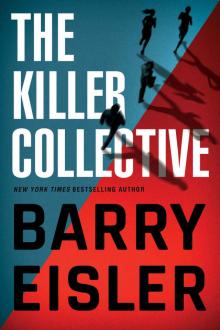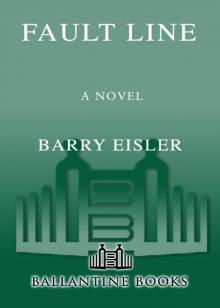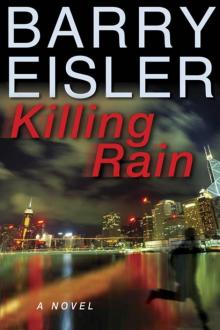- Home
- Barry Eisler
All the Devils Page 2
All the Devils Read online
Page 2
Snake laughed. “No one cares, sweetheart.”
Boomer rubbed his chin. Now that he thought about it, Snake did have a point. The papers said Noreen was living, where—in Denver, that’s right. Boomer hadn’t been anywhere near Denver. Hell, other than Fort Carson over ten years earlier, he’d never even been in Colorado. His schedule was always full, his whereabouts easy to prove. If Noreen had disappeared three days ago in Denver, he couldn’t possibly have been involved.
Snake said, “You need me, brother. Don’t tell me she’s the only one.”
Noreen shook her head violently. “Mmmmmmph!” she said again.
Boomer kept looking at her. It was nice how scared she was. He felt himself getting hard.
He reached out and brushed the back of his fingers against Noreen’s cheek. She jerked away as though from an electric shock. He laughed and gripped her by the jaw. Looked into her terrified eyes.
“Noreen,” he said. “You really missed me. What do you think, let the good times roll?”
“Mmmmmmph!” Noreen said. “Mmmmmmph!”
“You want me to inflate the dinghy?” Snake said. “Get this done?”
Boomer turned Noreen’s head from side to side. She struggled but couldn’t do anything to stop him from moving her the way he wanted.
“I don’t know,” he said, smiling. “I feel like . . . the night’s still young, right?”
Snake laughed and clapped him on the back. “Brother, you read my mind.” He reached into a pocket and pulled out an iPod. “Brought some music, too. Just in case.”
Damn, if Snake wasn’t the best friend ever. Boomer smiled into Noreen’s eyes. “All right,” he said. “Let’s do it. Let the good times roll.”
1
“Detective Lone,” Chief Best said in her slightly breathless drawl, coming out from behind her desk and heading toward Livia. “Well, aren’t you the prodigal.”
Livia wasn’t sure how to respond, so she stayed at the door and just said, “Chief Best.” She saw the embrace coming and, when it arrived, managed not to stiffen. Off the mat, she didn’t like to be touched.
“Charmaine, please,” Best said, releasing her. “At least when it’s just us girls. Come in, come in. Can I offer you some coffee?”
“Water’s fine.”
“Oh, that’s right.” She glanced at her admin in the outer office. He was already on his way to the cooler. “Thank you, Lloyd,” she called after him.
They walked over to a corner sitting area. Best gestured to the couch, which faced the wall-to-wall window, and took one of the chairs facing inward herself. Livia sat. In the distance, she could see the choppy surface of Elliott Bay, gray in the fall Seattle rain. Offering the view was ostensibly courteous. But of course it was also a way of reminding Livia of the chief’s inherent power. It wasn’t a coincidence that the wall adjacent to the window was covered with framed photographs of Best—something of a celebrity as SPD’s first black female chief of police—with the governor, the mayor, and a dozen other VIPs. There was a reason detectives liked to interview suspects in the station rather than at the suspects’ homes, and though chief of police was more chief than police . . . well, once a cop, as the saying went.
“Forgive me,” Best said, leaning forward in her chair the way interrogators did to promote a feeling of shared interests. “I’ve been meaning to congratulate you in person, but it’s sometimes hard to get out from under all the political bullshit. Anyway, I’m glad—though not at all surprised—you were cleared in the officer-involved. As open-and-shut a case of a cop righteously defending herself as there could possibly be.”
Best was talking about the ambush a month earlier at the martial-arts academy where Livia taught women’s self-defense. Livia had killed both attackers with her duty weapon. And because Seattle PD was still operating under a settlement agreement following a DOJ finding of a pattern of excessive force, the investigation had been especially thorough. Still, in the end, the recommendation to clear had been unequivocal, and the Force Review Board had agreed.
“Thank you, Chief. Charmaine.”
Lloyd came by with a glass of water, set it down, and left, closing the door behind him.
Best paused for a moment, maybe waiting to see if the silence would induce Livia to add anything. When it didn’t, Best said, “Of course, whoever killed those snipers across the river from your apartment could likely have claimed self-defense as well.”
Livia nodded, feeling increasingly wary. The “whoever” had been Dox, who she called Carl, the former marine sniper she had partnered with in Thailand and who was now . . . she didn’t know what to call it. A friend, certainly. But also a lot more. Carl had anticipated that the same people who’d come at her at the martial-arts academy might deploy a team outside her place as well, and had preempted them.
Livia didn’t want to engage, but she knew Best was going to press, and continuing to dodge would have looked suspicious. So she said, “I guess nothing new on who they were, or who might have sent them?”
Best shook her head. “No. Ghosts, just like the two at your self-defense class. No ID, no DNA matches, nothing in the IAFIS. And no one claiming the bodies. Ghosts.”
The IAFIS was the Integrated Automated Fingerprint Identification System, a database of criminal and civilian prints maintained by the FBI. And the “ghosts,” Livia knew, had been sent by OGE—Oliver Graham Enterprises, recently renamed Percivallian—the world’s largest private military contractor.
Livia took a sip of water. “I guess it’s not surprising at this point. We can probably assume they were sent as part of the attempted cover-up of that Secret Service child-pornography ring.”
“A ring you uncovered. And then blew wide open. You are a force to be reckoned with, Livia.”
Livia knew the chief was probing. That was no surprise. It was what might be behind the probes that concerned her. She set down the water glass. “Just doing my job.”
Best offered a slight smile. “Well. I think we both know you go far beyond just that.”
Livia felt a nervous tightness in her gut. The chief’s comment could have been based on almost anything—from nothing more than vague unease; to suspicions about the rapists Livia had tracked down and killed over the years; to how she and her little sister, Nason, had been trafficked as girls from their Lahu village in Thailand, and how Livia had escaped from the people behind it, and discovered what they’d done with Nason, and taken her revenge on all of them, her revenge and Nason’s, too.
But all she said was “Charmaine, you’re very kind.”
Best blinked, maybe surprised her comment had elicited so little. “No,” she said after a moment. “I’m really not. I look at you, and I see a cop fearless and determined enough to go after the Secret Service if that’s what justice requires. To take on the FBI when they try to cover things up. And who finds a way to expose everyone implicated, surviving multiple assassination attempts in the process. You have nothing but my gratitude and admiration. It’s just frustrating we’ll likely never learn who was behind your assailants.”
Not from me you won’t.
“I wish we could learn more, too,” Livia said. “But I’ll settle for seeing the people involved with that ring punished.”
Whether that would happen, of course, remained to be seen. Three exceptionally rich senators and the head of the FBI’s Criminal Investigative Division had a lot of resources they could fight back with, and so far they seemed determined to do so.
Best nodded. “Fair enough. And I’ll settle for knowing that now that the cover-up has failed, you’re safe. Donna was right about that. I owe her an apology.”
Donna Strangeland, Livia’s lieutenant, had wanted to go public with their suspicions early on, as a way of protecting Livia. Best had overruled her. It interested Livia that the chief hadn’t yet gotten around to the apology. It seemed she wanted to have this chat with Livia first.
“Well,” Best said, coming to her feet. “I’m glad we got
to talk. You are an officer to watch, Livia Lone.”
Livia waited until she was alone in the elevator to blow out a long breath. Obviously, Best suspected—but what, exactly? More importantly, what did she know? And why was she holding back?
Well, anytime a cop interrogated a suspect, the questions unavoidably revealed aspects of the cop’s case. Maybe Best’s reticence was no more than that. The chief had wanted to sweat her, hadn’t gotten much, and had ended the interview before revealing more than she wanted to.
But that didn’t mean Best wouldn’t keep working the case. Or that there wouldn’t be more interviews to come.
2
Boomer leaned back in his chair, trying to appear nonchalant. He hoped it was working. It was embarrassing to admit even to himself, but his father always intimidated him. And it had gotten worse since the old man made veep. Now when he came to visit Boomer’s San Diego office, there was always an advance Secret Service team checking for bombs, sweeping for bugs, making Boomer feel like a hick. Three of them were combing the room now, and Boomer wondered for a moment whether they’d been told to lay it on extra thick for Boomer, just to remind him of who was the boss.
When it was finally over, the agents walked out, not bothering to close the door behind them. So the old man didn’t have to knock. He just strolled right in like he owned the place.
“Admiral,” Boomer said, resisting the urge to stand. It was what everyone had started calling him beginning when he’d gotten his fourth star—even Boomer and his sister. For whatever reason, the title had stuck after the old man had retired from the navy and run for Congress. Reporters called him Mr. Vice President now, but people who knew him from back in the day still used Admiral. Which the prick obviously liked, otherwise he would have issued cease-and-desist orders a long time before.
“Bradley,” the old man said, closing the door behind him. He tugged one of the two chairs facing Boomer’s desk a foot to the left and then, apparently satisfied, sat in it. Why did he have to do that shit? He just couldn’t help himself, he always had to demonstrate some kind of control over other people’s spaces. It was like a dog scent-marking its territory. The prick was well into his sixties now, and though he still had the trademark ramrod posture and hit the gym at least three days a week, Boomer could have kicked his ass all over the room if he’d wanted. Which made the damn . . . meekness he felt even more humiliating.
The old man glanced left and right, then at Boomer. “I like what you’ve done with the place.”
Beyond hanging new pictures, Boomer hadn’t changed a thing since inheriting the seat six years earlier. Are you just fucking with me?
“What are you talking about?” he said, looking around in case he was missing something. “It’s practically the same as when it was yours.”
The old man smiled. “That’s what I like.”
He should have seen that coming. He would have, too, if it had been anyone else. But the old man always made him feel like a dumb, awkward kid again.
“Anyway,” the old man went on. “I’m in town for a fundraiser. There’s money here, but nationally California’s a lost cause.”
Boomer nodded, waiting for him to get to whatever had really brought him.
“Well,” he said after a moment, looking at Boomer closely. “Your polls are looking good, anyway. You think that ‘Me Too’ woman is going to come out of the woodwork again?”
Boomer looked into the ice-blue eyes. They were especially startling in contrast to the prematurely white hair, and they were a key part of the intimidation effect. When the old man stared, it made you feel you were hooked up to a lie detector. Something you couldn’t fool. Something inhuman.
“No,” Boomer said. “She’s a liar. The whole thing was a stunt engineered by my political enemies and intended to smear me.”
The old man gave an exaggerated nod, a pantomime of understanding. “Yes, I believe I’ve heard that verbatim in several of your television interviews.”
Boomer suppressed a surge of irritation. “How many times did you tell me when I took over your seat that I had to stay on message?”
“Quite a few, as I recall. Though I don’t recall telling you to sound like a robot, either. It’s a delicate moment. Be careful not to come across as callous.”
“My media people tell me the opposite. That sensitivity will make me look weak. Even guilty. That outrage at being slimed and slandered is better.”
Among those media people, of course, was unofficial advisor Snake. And damn if the crazy bastard didn’t have good PR instincts. The professionals had been more detailed in their advice, of course, but substantively everything they’d been telling him tracked perfectly with what Snake had counseled that night at the Salton Sea.
“‘Slimed and slandered,’” the old man said. “I remember that from the television interviews, too. The alliteration is catchy, I’ll give you that.”
“I’ll be sure to pass along your praise,” Boomer said, trying for defiant, but succeeding mostly in feeling petty.
The old man ignored the jibe, reinforcing Boomer’s sense of feebleness. He fixed Boomer with the ice-blue stare. “Are there going to be others?”
Boomer almost said, How can I answer that, when there are obviously no depths to which my opponents won’t stoop in trying to slander me, which was what his media experts had gamed out in preparation for just such a question. But of course, the line would only elicit another criticism about the dangers of sounding too scripted.
So instead, he just shrugged. “I don’t know.”
“Because I went to great lengths when you were in high school, cleaning up after your peccadilloes. Noreen Prentis was only one of them. If any more are going to recrudesce, I need to know.”
Jesus, the old man and his Naval Academy vocabulary. “I don’t know,” Boomer said again.
“What are you going to do if it happens?”
“I’ll handle it.” He was tempted to add, Like I handled Noreen. But that would have crossed a line Boomer knew he had to maintain.
“I need you to keep me posted. It’s not just you who stands to be affected by this. It’s not just me. It’s the president as well.”
He paused to let that sink in, then continued. “You need his support in this race, Bradley, and if he decides you’re radioactive because another half-dozen Noreens are going to start telling their stories, he’ll distance himself. If we want to turn out your base in this state—and God knows we need to—we can’t have that happen. Do you understand?”
“I understand.” Damn it, he hated the way the old man could get him to revert to practically saluting.
“You’ve made a lot of choices I didn’t agree with,” the old man said, the eyes boring in. “Skipping college, when you would have been a legacy at Annapolis—”
“I don’t have to do everything the way you and Gramps did,” Boomer said.
But all it did was make him feel petulant. And give the asshole an opportunity to ignore him.
“And then the army instead of the navy,” the old man continued. “Special Forces instead of an intelligence rating.”
“It’s called an MOS in the army.”
“I know what the heathens call it. My point is, it’s worked out well for you. You needed the discipline, obviously. And you acquitted yourself admirably. Three Purple Hearts—”
“Enemy Marksmanship Badges.”
“—and a Silver Star for heroism in Fallujah. Got a smart name for that one?”
Boomer didn’t. Besides, he didn’t know where the old man was going with all this, and wasn’t even sure why he was pushing back.
“You think I don’t know it hasn’t been easy, Bradley? What do you think it was like for me at Annapolis, with my own father an admiral?”
Boomer might have said, Why do you think I didn’t want to go there, but what would have been the point?
“But I climbed higher than he did,” the old man continued. “I stood on the platform he built, yes, but I
climbed higher. That’s the only way to get out from a father’s shadow. Do you understand what I’m telling you?”
Boomer shook his head. “No.”
“The platform I built, and that you’re standing on, is the vice presidency. And if you want to escape from my shadow, you’ll have to climb even higher. But you can, son. You can climb that high. As long as you’re cognizant of the one thing that can stop you.”
For whatever reason, the old man’s words weren’t encouraging Boomer. They were scaring him. “What?” he said.
“The past,” the old man said. “The person you were. Who you no longer are. And who you can no longer be. You’re not Hal anymore, Bradley. You’re Henry. Remember that. And you can climb higher than almost anyone. Not just anyone in this family. Anyone in history.”
Boomer nodded. He felt a little sick. “Okay.”
“So if you have reason to believe there are any other skeletons threatening to tumble out of your closet, you need to tell me.”
“I don’t.”
The old man waited a long beat, then stood and started to move toward the door. He had his hand on the knob when he turned back to Boomer and fixed him with the stare. “And while you’re at it. Be sure you don’t make any new ones.”
With that, he turned again and left, closing the door behind him.
Boomer sat for a few minutes afterward, just breathing, willing away the queasy feeling.
Not for the first time, he wondered how much the old man knew. A little, or a lot?
It didn’t matter. How to handle it was the same either way. He went to a wall safe, opened it, and took out a burner. It was time to call Snake.
3
Livia sat in front of her laptop, reviewing case notes, her loft illuminated by nothing but the glow of the screen and the ambient light from the container facilities across the Duwamish. It wasn’t uncommon for her to be up in the wee hours. She’d struggled with insomnia since she was thirteen, when the men had taken her and Nason. She was used to it, and for the most part no longer fought it. Instead, she would roll off her futon, make herself a snack of yogurt, granola, and berries, and work at the computer, comfortable being awake and alert while the world around her slumbered. And then, as a line of pink began to glow outside the windows, she’d feel tired again and catch another hour or two before heading out to the office.

 All the Devils
All the Devils Requiem for an Assassin
Requiem for an Assassin The Killer Collective
The Killer Collective The Chaos Kind
The Chaos Kind The God's Eye View
The God's Eye View Paris is a Bitch
Paris is a Bitch The Khmer Kill: A Dox Short Story (Kindle Single)
The Khmer Kill: A Dox Short Story (Kindle Single) The Last Assassin
The Last Assassin The Detachment
The Detachment The Night Trade (A Livia Lone Novel Book 2)
The Night Trade (A Livia Lone Novel Book 2) Fault Line
Fault Line Hard Rain
Hard Rain The Khmer Kill_A Dox Short Story
The Khmer Kill_A Dox Short Story London Twist: A Delilah Novella
London Twist: A Delilah Novella The Lost Coast
The Lost Coast Rain Fall
Rain Fall Zero Sum
Zero Sum Killing Rain
Killing Rain John Rain 08: Graveyard of Memories
John Rain 08: Graveyard of Memories A Clean Kill in Tokyo (previously published as Rain Fall)
A Clean Kill in Tokyo (previously published as Rain Fall) Inside Out: A novel
Inside Out: A novel John Rain 07 - The Detachment
John Rain 07 - The Detachment Graveyard of Memories
Graveyard of Memories The Lost Coast -- A Larison Short Story
The Lost Coast -- A Larison Short Story Zero Sum (A John Rain Novel)
Zero Sum (A John Rain Novel)